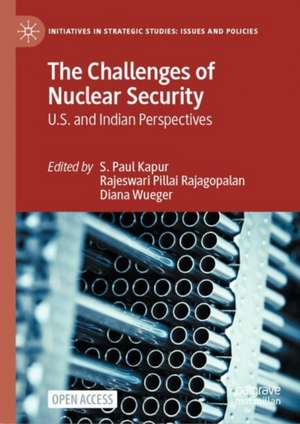The Challenges of Nuclear Security: U.S. and Indian Perspectives: Initiatives in Strategic Studies: Issues and Policies
Editat de S. Paul Kapur, Rajeswari Pillai Rajagopalan, Diana Wuegeren Limba Engleză Hardback – sep 2024
Preț: 426.56 lei
Nou
Puncte Express: 640
Preț estimativ în valută:
81.62€ • 87.28$ • 68.06£
81.62€ • 87.28$ • 68.06£
Carte tipărită la comandă
Livrare economică 17 aprilie-01 mai
Preluare comenzi: 021 569.72.76
Specificații
ISBN-13: 9783031568138
ISBN-10: 3031568133
Pagini: 250
Ilustrații: Approx. 250 p. 2 illus.
Dimensiuni: 148 x 210 mm
Greutate: 0.54 kg
Ediția:2024
Editura: Springer International Publishing
Colecția Palgrave Macmillan
Seria Initiatives in Strategic Studies: Issues and Policies
Locul publicării:Cham, Switzerland
ISBN-10: 3031568133
Pagini: 250
Ilustrații: Approx. 250 p. 2 illus.
Dimensiuni: 148 x 210 mm
Greutate: 0.54 kg
Ediția:2024
Editura: Springer International Publishing
Colecția Palgrave Macmillan
Seria Initiatives in Strategic Studies: Issues and Policies
Locul publicării:Cham, Switzerland
Cuprins
Chapter 1: Mitigating Insider Threats and Ensuring Personnel Reliability.- Chapter 2: The Role of Organizational Culture in Nuclear Security.- Chapter 3: Emergency Response and Crisis Communications.- Chapter 4: Physical Protection of Nuclear Facilities and Materials.- Chapter 5: Controlling and Managing Radioactive Sources.- Chapter 6: Cyber Security and Nuclear Facilitiesā.
Notă biografică
S. Paul Kapur is Professor in the National Security Affairs Department at the Naval Postgraduate School and a visiting fellow at Stanford University’s Hoover Institution.
Rajeswari Pillai Rajagopalan is Director of the Centre for Security, Strategy and Technology (CSST) at the Observer Research Foundation, New Delhi.
Diana Wueger is Faculty Associate for Research in the National Security Affairs Department at the Naval Postgraduate School and a PhD Candidate at the University of Chicago.
Textul de pe ultima copertă
“Brings out the complexity of securing facilities, managing supply chains, disposing of waste, and the threat from cyber attacks. Will serve as a guideline to security practitioners.”
– Shiv Sahai, former Additional Secretary, Indian National Security Council Secretariat
“[A] valuable addition to the literature on nuclear safety and security. The authors clearly demonstrate the need to evolve our thinking to keep up with technology and culture. We learn more from the sharing of Indian and U.S. perspectives than either country’s viewpoints can provide alone.”
– Andrea G. Hall, former Special Assistant to the President and Senior Director for WMD and Counterproliferation, National Security Council
“Standout essays from scholars and practitioners in the field of nuclear safety and security. The volume will serve as an excellent introduction to the subject’s many interlocking dimensions.”
– Richard Johnson, DASD (OSD-P/NCWMD)
“This study is the most relevant work today to assess the risk of laxity in nuclear security. Extremely useful to learn from each other and develop trust.”
– VG Khandare, Principal Adviser to the Ministry of Defence, India
This Open Access volume assembles experts from the United States and India to examine six issues essential to the safety and security of nuclear facilities, technologies, and materials: insider threats, organizational culture, emergency response, physical protection, control of radioactive sources, and cyber security. Each chapter includes papers by an Indian expert and by an American counterpart. This unique structure contrasts the countries’ diverse perspectives on nuclear security, situates technical problems within larger socio-political contexts, and identifies cooperative opportunities for the U.S. and India.
S. Paul Kapur is Professor in the National Security Affairs Department at the Naval Postgraduate School and a visiting fellow at Stanford University’s Hoover Institution.
Rajeswari Pillai Rajagopalan is Director of the Centre for Security, Strategy and Technology (CSST) at the Observer Research Foundation, New Delhi.
Diana Wueger is Faculty Associate for Research in the National Security Affairs Department at the Naval Postgraduate School and a PhD Candidate at the University of Chicago.
“[A] valuable addition to the literature on nuclear safety and security. The authors clearly demonstrate the need to evolve our thinking to keep up with technology and culture. We learn more from the sharing of Indian and U.S. perspectives than either country’s viewpoints can provide alone.”
– Andrea G. Hall, former Special Assistant to the President and Senior Director for WMD and Counterproliferation, National Security Council
“Standout essays from scholars and practitioners in the field of nuclear safety and security. The volume will serve as an excellent introduction to the subject’s many interlocking dimensions.”
– Richard Johnson, DASD (OSD-P/NCWMD)
“This study is the most relevant work today to assess the risk of laxity in nuclear security. Extremely useful to learn from each other and develop trust.”
– VG Khandare, Principal Adviser to the Ministry of Defence, India
This Open Access volume assembles experts from the United States and India to examine six issues essential to the safety and security of nuclear facilities, technologies, and materials: insider threats, organizational culture, emergency response, physical protection, control of radioactive sources, and cyber security. Each chapter includes papers by an Indian expert and by an American counterpart. This unique structure contrasts the countries’ diverse perspectives on nuclear security, situates technical problems within larger socio-political contexts, and identifies cooperative opportunities for the U.S. and India.
S. Paul Kapur is Professor in the National Security Affairs Department at the Naval Postgraduate School and a visiting fellow at Stanford University’s Hoover Institution.
Rajeswari Pillai Rajagopalan is Director of the Centre for Security, Strategy and Technology (CSST) at the Observer Research Foundation, New Delhi.
Diana Wueger is Faculty Associate for Research in the National Security Affairs Department at the Naval Postgraduate School and a PhD Candidate at the University of Chicago.
Caracteristici
This book is open access, which means that you have free and unlimited access Brings together experts from the U.S. and India to address central problems of nuclear safety and security Groundbreaking insights into how the nuclear enterprises of India and the U.S. address common challenges A wealth of information for scholars, practitioners, and others interested in nuclear safety and security













